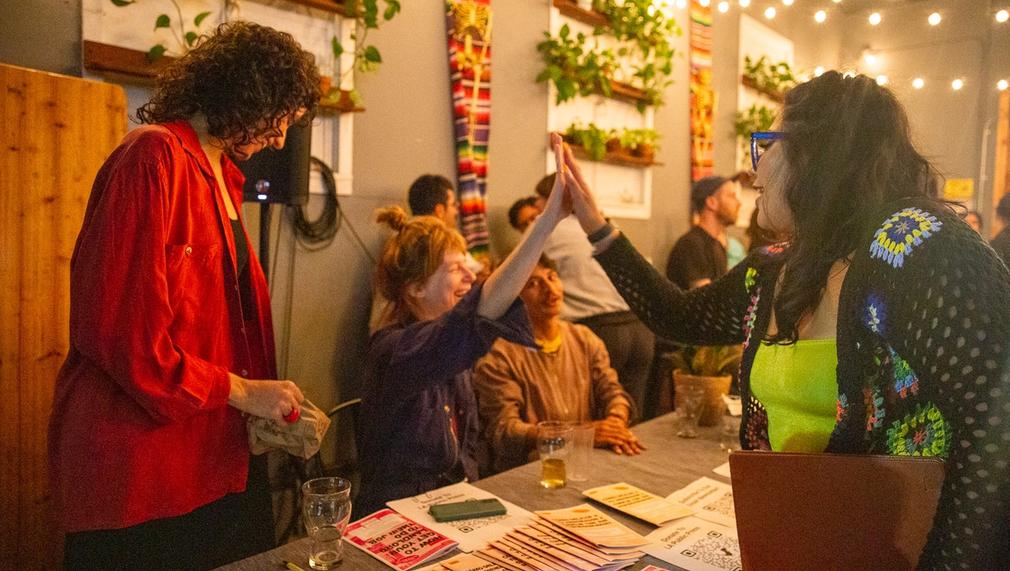Community Journalism for Housing Justice
Covering LA's housing crisis is central to our journalism at LA Public Press. Hundreds of Angelenos have told us housing security is by far their largest concern, and in 2024-25 we’re ready to double-down. We will expand our award-winning reporting on housing and homelessness, mature our renter’s help desk and call/text hotline, and publish accessible digital and physical media resources on tenants’ rights and housing literacy that help Angelenos self-organize for housing justice.

What is the primary issue area that your application will impact?
Social support networks
In what stage of innovation is this project, program, or initiative?
Expand existing project, program, or initiative (expanding and continuing ongoing, successful work)
What is your understanding of the issue that you are seeking to address?
Much of Los Angeles’ local news is irrelevant in the lives of LA County residents – a tremendous number who are desperately seeking information in order to avoid homelessness, and who generally lack social and information resources to find meaningful help.
Our region hosts the worst crisis of homelessness in the nation. On average, six people a day die while experiencing homelessness in LA County, yet local news seldom prioritizes the needs of those who are quite literally dying on the street.
It’s the difference between a story about a proposal to outlaw sleeping in a vehicle from the perspective of “stakeholders” who can show up to a meeting, versus the perspective of parents who have to decide where to park to safely sleep every night in that same jurisdiction. Whether or not the city votes to outlaw vehicular habitation, that family still needs a place to sleep.
Ensuring that perspective is heard is integral to individual survival, and developing workable policy solutions.
Describe the project, program, or initiative this grant will support to address the issue.
Our newsroom concentrates on the struggle of housing insecure tenants to avoid homelessness, and unhoused people struggling to survive. Our ethos prioritizes reporting directly for those who are most affected, and ensuring they are connected to information that’s immediately relevant to them. We publish accessible journalism that helps Angelenos find and build the tools they need to take action and advocate on behalf of themselves, their neighbors, and their communities. With support from LA2050, we will:
Publish accessible explanatory journalism that demystifies complex systems governing our housing economy, with special attention to how those systems squeeze poor tenants. Our tenants’ rights explainers like “How to Get Your Landlord to Do Their Job” – an easy to understand primer on housing habitability law – are among our most read and shared stories we have published. We want to build on our success, and dedicate more resources to explainers distributed through our existing community partners in housing justice, homelessness, and tenants’ rights CBOs. Launch a direct-to-user renters service desk and text hotline on housing habitability and tenant harassment. Modeled after Outlier Media in Detroit, direct messaging allows for a deeper engagement with our housing insecure audience. Direct-mailing engagement campaigns for tenants of specific, known bad-faith property owners, to educate tenants on their rights and help them organize for better conditions.
Describe how Los Angeles County will be different if your work is successful.
Addressing our biggest challenges — homelessness, pollution, policing, justice, corruption, transportation, housing, public health writ large — requires an ability to communicate with our neighbors. Only through a common understanding of the challenges we face can we consider what we must do, and plan for what we will do.
It is about information, and making sure people – you, your neighbors, your family, voters, change-seekers, and decision-makers – are equipped to understand the reality of our systemic issues, can see examples of others moving the needle, and are able to imagine ourselves on a pathway to participation we can feel confident about.
This means a Los Angeles County with: A more muscular tenants’ movement.
Better policies at city hall that respect and protect renters.
Greater government support for renters, and housing insecure residents who are on the verge of losing their housing, or have already lost it.
What evidence do you have that this project, program, or initiative is or will be successful, and how will you define and measure success?
Our journalism is consistently shared across our local news ecosystem, and in less than two years we’ve achieved greater social media reach and engagement than almost any other 501(c)(3) newsroom in Southern California on social media. Our stories are already read by more than 60,000 unique visitors every month. This drives public discussion and sets the agenda for other news agencies’ coverage. We have established publishing partnerships with LA TACO, Capital & Main, and Boyle Heights Beat, and forthcoming co-publishing projects The Guardian and Mother Jones/Reveal – all on tenants’ rights in Los Angeles. Our reporting is also cited in by other media outlets, in court filings (especially re: housing), public meetings, and is widely shared across the non-profit and justice-oriented organizational ecosystem. We recently won a first-place award at the Southern California Journalism Awards in the government-related investigative category.
Approximately how many people will be impacted by this project, program, or initiative?
Direct Impact: 100,000.0
Indirect Impact: 400,000.0